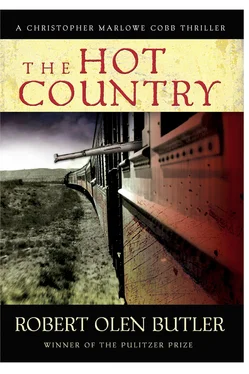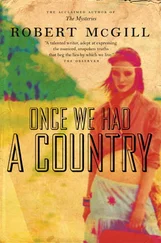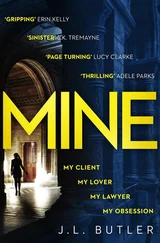Trask stopped for a moment. He wanted me to think about a massive, comprehensive war in Europe. He had a reasonable next point to make and I could probably guess it, but I tried to break his hold. I looked away from him, out the window, as if concentrating on the next drag of my Fatima. From where I was sitting, Lake Michigan stretched to the farthest horizon and vanished there, as if the world were flat and it dropped off the edge. From this conference room table, the lake seemed as vast as any ocean. It wasn’t. Far from it.
Which seemed significant in the present discussion. But I sure as hell couldn’t figure out how. I was just a reporter. A news writer. I was merely toying with a metaphor. Put it in. Make it fit. Play to the balcony. But there was a real world out there. I still had Hernando’s stitches in my arm. Itching like crazy. I killed four men. Recently. Men were dying in Mexico even as I sat here fiddling around with a metaphor about how something could seem way bigger than it is.
Trask said, “Every country loves to find an external enemy. It helps you understand who you are. You are you, as opposed — violently opposed — to them . We love that as much as anyone else, us Americans. Fifty years ago, we tried to do us versus them inside our own house. Fifty years later, we are in deep need of a viable new them . Your man Hearst knows that. He tried to give us Spain. And from how much he succeeded with as stupid a setup as that was, you can understand how deep that need must be. The Germans are perfect. There’s so much to hate about their regimented tight asses. They are very much unlike us, very much unlike the spirit of this country. And if you trumpet this story of yours about the Germans trying to stir up a Mexican invasion of the U.S.A., you will work up such widespread, mouth-foaming anti-German feeling that at the first opportunity, everyone from the senators in the capital to the boys in the bar down the street will demand we march off to Europe to make war on Germany. No President is strong enough to resist that. You publish your story, Mr. Cobb, and you will force the President’s hand. You will send our country to war when there may be some other way for us. Even if you personally think we should go to any war, any time, just let us at it, do you really want to make that decision for us all in tomorrow morning’s newspaper?”
He stopped talking. I’d more or less watched him while he spoke, though at the moment I was looking back out at the lake. What did I want? What was my real desire, not just the conventional objective of the character I’d decided to play from the script I was improvising as I went? That this story be published because every truthful news story needed to be printed no matter what? Not exactly. That Friedrich von Mensinger and the German government should be prevented from provoking a Mexican invasion of the United States?
I looked at Trask. “So who’s going to stop the Germans in Mexico? Mensinger’s making his case to Villa right now.”
Trask smiled. Not the little one. A big one. He said, “You are.”
I was. By personal request of the President, no less. And who would that require me to be?
I waited to hear. Trask took a drag on his cigarette and blew the smoke toward Lake Michigan. I stubbed my cigarette out in the table ashtray, even though it had a couple more puffs in it. And this much I felt keenly: A great, two-ton, plushly upholstered, crimson stage curtain had just fallen. It would shortly rise again, and I was in the midst of an actor’s recurring dream: I was about to go on stage and I had no clue even what the play was, much less what my lines were.
I supposed Trask was waiting once more for me to ask what was going on. He was my dark, opposite twin. I controlled a conversation by asking questions. He controlled it by making you ask. I was not doing it and he said, “Why do you think I’ve come here to carefully explain the killing of a story that is already dead?”
Which was a rhetorical question that simply squeezed me harder to inquire. And why didn’t I? Control, I supposed. I asked, “What does the ‘P’ stand for?”
This stopped him for only the briefest of moments. His eyes did not even flicker. “Polk,” he said.
“James Polk Trask,” I said.
“My grandfather insisted. He knew a good president when he saw one.”
“Do you ever use all three names?”
“Never,” he said.
I didn’t think so. Okay. I asked, “So what can I do for you?”
“Go back to Villa.”
“I’m not exactly persona grata down there anymore.”
“Why’s that?”
“I coldcocked the German emissary just before I vanished.”
Trask lifted his eyebrows and stubbed his cigarette next to mine.
“The typewriter’s mightier than the sword,” I said.
“Who started that?”
“He did.”
None of this made it into the stories I filed.
“Why?” Trask asked.
“He knew I was a journalist. He knew somebody’d searched his bags.”
“That’s how you discovered the contents of the documents.”
That wasn’t in the story either.
“My sources,” I said, flexing my fingers in the air before me.
Trask smiled. Then, upon further reflection, he laughed. This somehow didn’t surprise me. He said, “Tell me. When you rode with the Villistas, and the colorados attacked. Did you just watch and take notes?”
“No.”
“Did you fight?”
“Yes.”
He looked at me steadily, and I had the distinct impression that something behind those dark, flat eyes had awakened. Was he going to ask the next question? I waited. He knew the answer, but I’d make him ask, if he wanted me to say it.
“I do like you, Cobb,” he said. “You are the man for us, no doubt. Not just for me and for the President. For the country.”
And I wondered if he could see something awaken now in my eyes, which, I suspected, were usually as opaque as his.
“Did you respect Mr. Vogel?” he asked.
“Yes.”
“Do you understand that he was serving his country?”
“Yes.”
“The thing the President would have you do will yield no public story. But it will do a great service to your country. Far more than a newspaper story would do.”
He paused again. But he was not expecting a question now. He was choosing his words. I felt in my own pocket for a cigarette. I didn’t have one. He saw what I was doing and pushed his pack of Fatimas across the table toward me. I took up the pack and removed a cigarette and put it in my mouth. I pushed the pack back toward him. He leaned across the table and lit the cigarette for me.
He said, “Vogel was a reporter of sorts too. All such men working for our country are reporters. But their reporting methods are more diverse — as yours have become — and their readers are very selective, very elite. Your Christopher Cobb story wasn’t killed. It had the most important life of all. It informed the President of the United States. We are already on the alert about the plot, so your work has not been in vain. Far from it. They can no longer surprise us. But it would be much better still to prevent even the attempt, discredit the Germans in Mexico and win over Pancho Villa to us.”
“You and the President think I can do that?”
He said, “We think you will be very good at this sort of work.” He gave me that little smile of his.
I understood.
And the curtain rose.
And so I was flying two thousand feet above the very ground I crossed by horse a little over a week ago, the northern desert of estado Nuevo León. I was sitting on the leading edge of the lower wing of a Wright Model B aeroplane. Behind me the four-cylinder vertical engine pounded away and the two great pushing propellers spun in near invisibility; and around me the struts and rigging wires strained to keep our wings from flying off; and below me the long fall to the desert beckoned. My legs hung out over the empty air but my feet pressed hard against the shiny nickel-plated foot bar, as that and the mere friction of the wales of my corduroy-covered chair were the only things holding me in the machine.
Читать дальше












